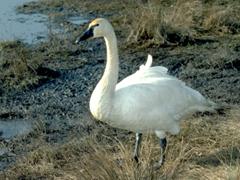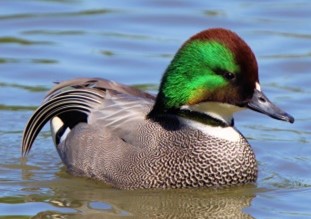Waterfowl Ecology and Management Course
| Dates: | January 21, 2025 |
|---|---|
| Meets: | Asynchronous online sessions |
| Location: | Online - Blackboard |
| Cost: | $1,800.00 |
There are still openings remaining at this time.
Waterfowl Ecology and Management is tailored to junior/senior standing undergraduates, graduate students, and working professionals. Prior knowledge of fundamental ecological and evolutionary principles is recommended. Course will be held as asynchronous.

About the course:
- For-credit (3) and non-credit options available
- Offered online with asynchronous sessions
- Tailored to junior/senior standing undergraduates, graduate students, and working professionals
- Graduate students and professionals will complete undergraduate requirements and write an in my opinion essay to earn graduate credit
- Dual language course; material will be presented in English and Spanish
Students will:
- Study history of waterfowl management, waterfowl evolutionary and annual ecology, waterfowl and plant identification, waterfowl habitat and harvest management, waterfowl diseases, and conservation of ducks, geese and swans.
- Learn about evolutionary histories and genetics, population ecology, and management of this dynamic and diverse group.
- Understand waterfowl and wetlands of North America, and discuss current waterfowl and wetland issues.
- Be exposed to best conservation and management practices of populations and their habitats, including how NGOs, state and federal agencies partner to conserve populations and their habitats.
- Review contemporary and classic literature are reviewed.
** It is advised that students have prior course work in basic ecology.
Non-credit option (Offered by the College of Science in partnership with Professional and Public Programs)
Tuition: $1800
A Certificate of Completion will be awarded at the successful completion of the course
Contact: p3cbt@utep.edu
For-credit option (Available from the College of Science)
Credits earned: 3 semester credit hours
Tuition: $600 per credit hour* for a total cost of approximately $1800 (*subject to in-state and out-of-state fees)
Contact: plavretsky@utep.edu
UTEP enrolled Students wishing to register in the for-credit option, please contact your Academic Advisor.
For Non-UTEP Students interested in receiving credit, please click on the link below for more information:
OFFICE OF ADMISSIONS & RECRUITMENT
Division of Student Affairs
https://www.utep.edu/inquire/?admissions


Notes:
This course will be held Asynchronous through Online Blackboard. Students will have 24/7 access.
Registrants will receive an invite to join the course via that platform.
COURSE WITHDRAWAL: Refunds will be issued, minus a 15% cancellation fee per course, cost of materials, and/or lab fees, if a written request is faxed, emailed, or mailed and received three business days prior to the first day of a scheduled course. Refund requests must include your name, daytime telephone number, and the course number or name. This policy applies to all registrations, regardless of the payment method. Phone requests will not be accepted for a refund.
There are no refunds for online courses.
NOTE: Please allow 2 -3 weeks for processing of refunds. No refunds will be given on or after the first class meeting. Cancellations 1-3 days before first class meeting incur a 50% cancellation fee. A $25 fee will be charged for returned or canceled checks. Send your request via: E–mail: ppp@utep.edu Fax: 915-747–5538 Mail: UTEP Professional and Public Programs 101 West Robinson Avenue Memorial Gym, Suite 111 El Paso, TX 79968–0602
| Fee: | $1,800.00 |
|---|
Online - Blackboard
Richard Kaminski, Co Developer
Dr. Richard M. Kaminski received his doctoral degree in Wildlife Biology and Management from Michigan State University in 1979. The MSU recognized Dr. Kaminski as an outstanding alumnus in 2022. Dr. Kaminski's specialty is waterfowl and wetlands ecology and management. He worked as a research biologist for Ducks Unlimited-Canada from 1979-1983. From 1983-2015, he was a faculty member of the Department of Wildlife, Fisheries, and Aquaculture at Mississippi State University. There he and his students conducted waterfowl and wetlands research, and he taught courses in these disciplines plus Wildlife Techniques and Professional Communications. He is an emeritus professor of Mississippi State and the former James C. Kennedy Endowed Chair in Waterfowl & Wetlands Conservation and Associate Dean of the College of Forest Resources. After retirement from Mississippi State in 2015, Dr. Kaminski was named the inaugural director of the James C. Kennedy Waterfowl & Wetlands Conservation Center of Clemson University. Dr. Kaminski retired from Clemson in 2021, is member of Clemson's Emeritus College, and continues to contribute to the waterfowl and wetlands profession.Philip Lavretsky,Instructor/Developer
Dr. Lavretsky obtained his PhD from Wright State University in 2014, and began running the Population and Evolutionary Lab at University of Texas at El Paso in 2016. His research program is interdisciplinary and transcends landscape, evolutionary, and conservation genomics to study speciation, evolution, adaptation, and the role of gene flow. Overall objectives of his research are to determine the distribution of genetic diversity across species' ranges to understand (1) the extent to which adaptive and non-adaptive genetic diversity shapes population structure, including (2) what genes are responsible for geographic adaption versus alternative selective pressures (e.g., sexual selection), (3) how contemporary pressures influence a species' adaptive landscape, and (4) how best to use this information to establish better management and conservation practices. Though Dr. Lavretsky has worked across various species, his primary research focus is on the evolution and conservation of waterfowl.


